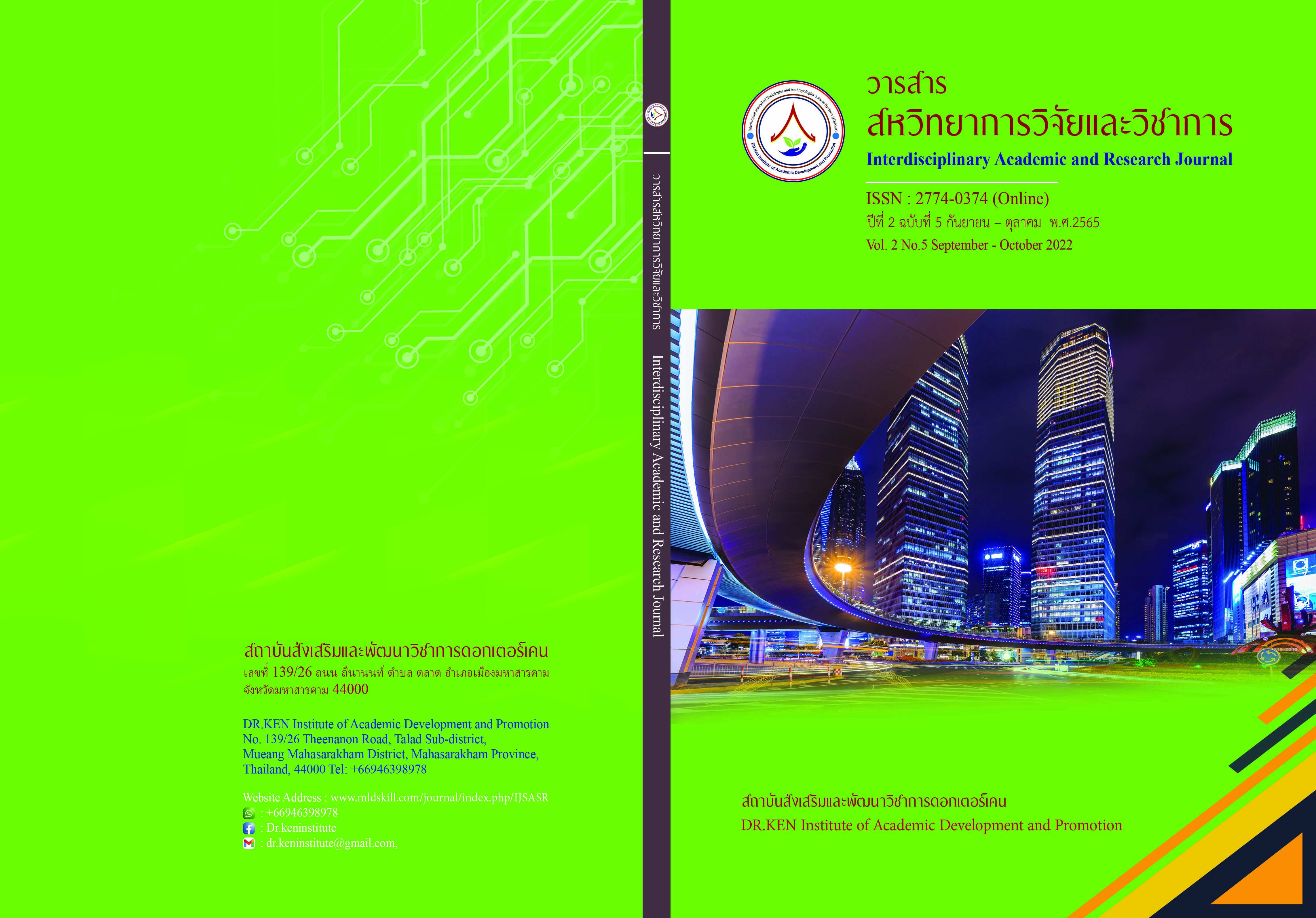Public Administration In the Era of Participation
DOI:
https://doi.org/10.14456/iarj.2022.90Keywords:
Participatory Public Administration; , the Era of Public ParticipationAbstract
The idea of giving people the opportunity to participate in expressing their opinions in public administration. To use in decision-making originated in ancient Greece and centuries. 18-20, which was republished in the Western world in 1960. Participatory public administration is an opportunity for people to participate in information and opinion management to seek alternatives and make decisions about proper public administration with all concerned parties and make it easier to implement. Therefore, this article aims to; (1) Study the concept of participatory public administration. (2) Forms and procedures of participatory public administration. (3) Conditions for participatory public administration. And (4) the benefits of participatory public administration. Participatory public administration originated in ancient Greece, but for Thailand it has become clear in its application to the Thai bureaucracy since 2003, which has stipulated the rights of the people in several sections of the Constitution of the Kingdom of Thailand in many editions, allowing the people to have the right to participate in government actions that affect the quality of life of the people and the development of the country in various. In addition, there is a growing public awareness of the right to awareness and the right to participate in what is often referred to as the era of participation and is likely to become even more in the future. As a result, the government sector needs to be adapted to become a bureaucratic system that inevitably allows people to take part in the administration of public affairs that is more concrete.
References
ถวิลวดี บุรีกุล และคณะ. (2551). คู่มือการมีส่วนร่วมของประชาชน: การตัดสินใจที่ดีกว่าโดยให้ชุมชนมีส่วนร่วม. นนทบุรี: สถาบันพระปกเกล้า.
ถวิลวดี บุรีกุล และเมธิศา พงษ์ศักดิ์ศรี. (2548). การสนทนากล่มุ: เทคโนโลยีเพื่อการมีส่วนร่วมและ การเก็บข้อมูลเพื่อการวิจัย. กรุงเทพมหานคร: จรัลสนิทวงศ์การพิมพ์
ถวิลวดี บุรีกุล. (2548). การมีส่วนร่วม แนวคิด ทฤษฎีและกระบวนการ. กรุงเทพฯ: สถาบันพระปกเกล้า.
ถวิลวดี บุรีกุล. (2551). การมีส่วนร่วม แนวคิด ทฤษฎีและกระบวนการ. กรุงเทพฯ: สถาบันพระปกเกล้า.
ทานตะวัน อินทร์จันทร์. (2546). การมีส่วนร่วมของคณะกรรมการชุมชนในการพัฒนาชุมชนย่อยในเขต เทศบาลเมืองลำพูน. การค้นคว้าอิสระรัฐประศาสนศาสตรมหาบัณฑิต สาขาวิชารัฐประศาสนศาสตร์, บัณฑิตวิทยาลัย มหาวิทยาลัยเชียงใหม่.
ธีระชัย รัตนโรจน์มงคล. (2553). วศ.กับการมีส่วนร่วมของประชาชน. วารสารกรมวิทยาศาสตร์บริการ, 58 (184),21-31.
นงนภัส คู่วรัญญู เที่ยงกมล. (2551). สิ่งแวดล้อมและการพัฒนา. กรุงเทพฯ: สำนักพิมพ์แห่งจุฬาลงกรณ์มหาวิทยาลัย.
นฤดม ทิมประเสริฐ. (2554). กระบวนการมีส่วนร่วมของประชาชนที่ตั้งอยู่บนพื้นฐานของสิทธิชุมชนในการ จัดทำข้อบัญญัติท้องถิ่นทางทะเล:กรณีศึกษาองค์การบริหารส่วนตำบลท่าศาลา จังหวัดนครศรีธรรมราช. วิทยานิพนธ์รัฐประศาสนศาสตรมหาบัณฑิต, คณะรัฐประศาสนศาสตร์สถาบันบัณฑิตพัฒนบริหารศาสตร์.
ปาริชาติ วลัยเสถียร. (2542). ทฤษฎีและหลักการพัฒนาชุมชน สาขาพัฒนาชุมชน. กรุงเทพฯ: มหาวิทยาลัยธรรมศาสตร์.
พงษ์ธร จันทร์สวัสดิ์. (2540). การมีส่วนร่วมของประชาชนในระดับท้องถิ่น ศึกษาเปรียบเทียบกระบวนการ จัดตั้งธนาคารหมู่บ้าน จังหวัดพิษณุโลกและจังหวัดอุบลราชธานี. วิทยานิพนธ์รัฐศาสตรมหาบัณฑิต, สาขารัฐศาสตร์ จุฬาลงกรณ์มหาวิทยาลัย.
สำนักงานคณะกรรมการพัฒนาระบบราชการ. (2557). คํานิยามศัพท์ที่ใช้เกี่ยวกับการบริหารราชการแบบมีส่วนร่วม. [Online] http://www.opdc.go.th/special.php?spc_id=2&content_id=2549 [13 พฤศจิกายน 2557]
สำนักงานคณะกรรมการพัฒนาระบบราชการ. (2560). การบริหารราชการแบบมีส่วนร่วม: เทคนิควิธีและการนำไปสู่การปฏิบัติ. กรุงเทพฯ: ศูนย์สื่อและสิ่งพิมพ์แก้วเจ้าจอม มหาวิทยาลัยราชภัฏสวนสุนันทา.
สำนักงานเลขาธิการสภาผู้แทนราษฎร. (2561). การมีส่วนร่วมทางการเมืองในระบอบประชาธิปไตย. กรุงเทพฯ: สำนักการพิมพ์ สำนักงานเลขาธิการสภาผู้แทนราษฎร.
สิริพัฒน์ ลาภจิตร.(2550). ปัจจัยที่ส่งผลต่อการตัดสินใจมีส่วนร่วมของประชาชนในการสนับสนุนการบริหารงานองค์การบริหารส่วนตำบล อำเภอวารินชําราบ จังหวัดอุบลราชธานี. วิทยานิพนธ์ หลักสูตรปริญญารัฐประศาสนศาสตรมหาบัณฑิต สาขาวิชารัฐประศาสนศาสตร์ภาควิชารัฐประศาสนศาสตร์ คณะรัฐศาสตร์จุฬาลงกรณ์มหาวิทยาลัย.
อรทัย ก๊กผล และฉัตรระวี ปริสุทธิญาณ. (2553). บันทึกเรื่องเด่นรางวัลพระปกเกล้า ด้านความโปร่งใสและส่งเสริมการมีส่วนร่วมของประชาชน. กรุงเทพมหานคร: สถาบันพระปกเกล้า.
อรทัย ก๊กผล. (2552). คู่คิด คู่มือ การมีส่วนร่วมของประชาชนสำหรับผู้บริหารท้องถิ่น. กรุงเทพฯ: ส.เจริญการพิมพ์
Andrew P., and Stiefel M. (1979). Inquiry in participation a Research Approach in UNRISD Participation Programme. Geneva
Gonzalez de Asis, Maria., and Acuna-Alfaro, Jairo. (2001). Civic Participation in Local Governance. [Online] http://www.worldbank.org/wbi/governance/pdf /fy02brief/civic-local-annex.pdf
Bertcher, H. J. (1994). Group participation: Techniques for leaders and members (2nd ed.). Thousand Oaks, CA: Sage.
Cohen, J.M., & Uphoff, N.T. (1981). Rural Development Participation: Concept and Measure for Project Design Implementation and Evaluation: Rural Development Committee Center for International Studies. New York: Cornell University Press.
Cohen, M. J. & Norman, T. U. (1980). Participations Place in Rural Development: Seeking Clarity Through Specificity. New York: World Development.
Farmer-Centred Agricultural Resources Management Programme (FARM). 1998. Participatory Assessment and Planning. Bangkok: FAO-UNDP.
Lisk, Franklyn. (1985). Popular participation in planning for basic needs: concepts, methods, and practices. Hants, Gower p. 15.
Srinivasan, L. (1990). Tools for Community Participation: A Manual for Training Trainers in Participatory Techniques. United Nations Development Program. Promotion of the Role of Women in Water and Environmental Sanitation Services, Program, New York, NY
Downloads
Published
How to Cite
Issue
Section
License
Copyright (c) 2022 ยุภาพร ยุภาศ

This work is licensed under a Creative Commons Attribution-NonCommercial-NoDerivatives 4.0 International License.
Copyright on any article in the Interdisciplinary Academic and Research Journal is retained by the author(s) under the under the Creative Commons Attribution-NonCommercial-NoDerivatives 4.0 International License. Permission to use text, content, images, etc. of publication. Any user to read, download, copy, distribute, print, search, or link to the full texts of articles, crawl them for indexing, pass them as data to software, or use them for any other lawful purpose. But do not use it for commercial use or with the intent to benefit any business.
















.png)


